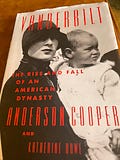“Vanderbilt: the Rise and Fall of an American Dynasty” by Anderson Cooper and Katherine Howe
The name “Vanderbilt” has been synonymous with New York City since its inception. In the early 1600s, Jan Aersten van der Bilt (Dutch for “from Bilt”) came over as an indentured servant and wound up in Flatbush. The Vanderbilt dynasty ended, for all intents and purposes, in 2019 with the death of Gloria Vanderbilt.
So says Anderson Cooper, Gloria’s son, who together with Katharine Howe has written “Vanderbilt: The Rise and Fall of an American Dynasty,” a straightforward but engaging tale of the Vanderbilt family and their considerable impact on New York City.
The first Cornelius, born in Staten Island, started as a ferry man and went on to built a railroad empire that brought him riches equal to those of a 21st-century tech billionaire. The crafty, near-illiterate “Commodore” played fast and loose with his heirs, however, leaving his equally venal son Billy with everything and the others with practically nothing.
Fast forward to the Gilded Age (1870-1900), a term coined by Mark Twain to connote “something that was shiny on the surface but corrupt underneath.” Alva Vanderbilt, an upstart
from the South who married into the family, battled Caroline Astor for primacy in New York society—once throwing a costume ball at her home on Fifth Avenue and 52nd Street that would leave today’s Met Ball in the shadows.
Cooper concentrates on the events in the Vanderbilt family that parallel America’s most notable events: the sinking of the Lusitania (where great-great uncle Alfred died); the 1934 America’s Cup race (which Harold Vanderbilt won for America); the notorious custody battle for Little Gloria during the Depression; and finally a touching tribute to a 91-year-old Gloria, who died from stomach cancer.
The takeaway from this book is that while the name “Vanderbilt” is often synonymous with wealth, the family’s real legacy lies in their fame rather than their fortune. Most of the early Vanderbilts achieved their enormous riches in the 19th century before the introduction of the income tax or property taxes. Later on, their wealth was further depleted because of their profligate spending habits (including Gloria’s, too, Anderson acknowledges.)
Every chapter in “Vanderbilt” begins with a quote,
and perhaps the most telling is the one that kicks off the book. Again, it’s from Mark Twain written hypothetically to a family member in 1869: “Don’t misunderstand me, Vanderbilt. I know you own $70 millions; but then you know and I know, that it isn’t what a man has, that constitutes wealth. No—it is to be satisfied with what one has; that is wealth.” We need more wise men like this, perhaps now more than ever.


